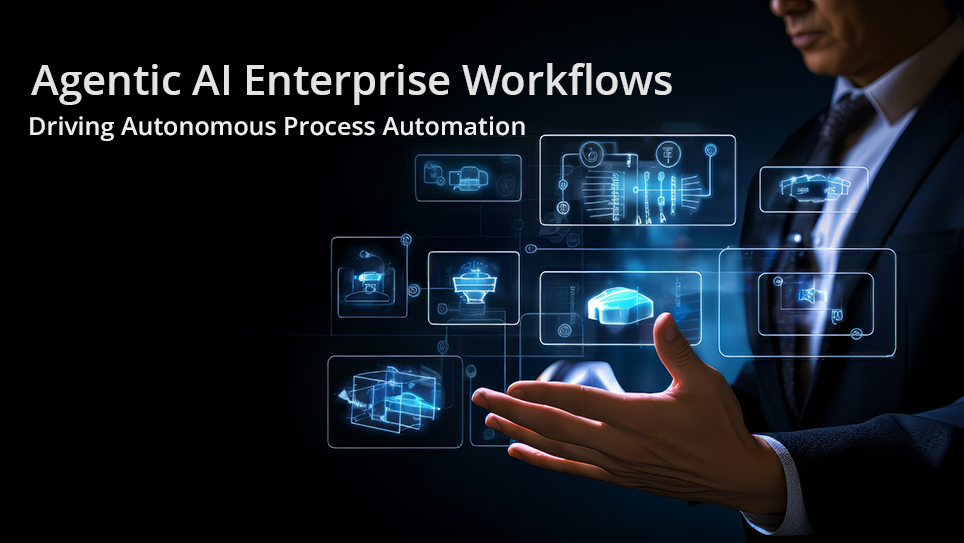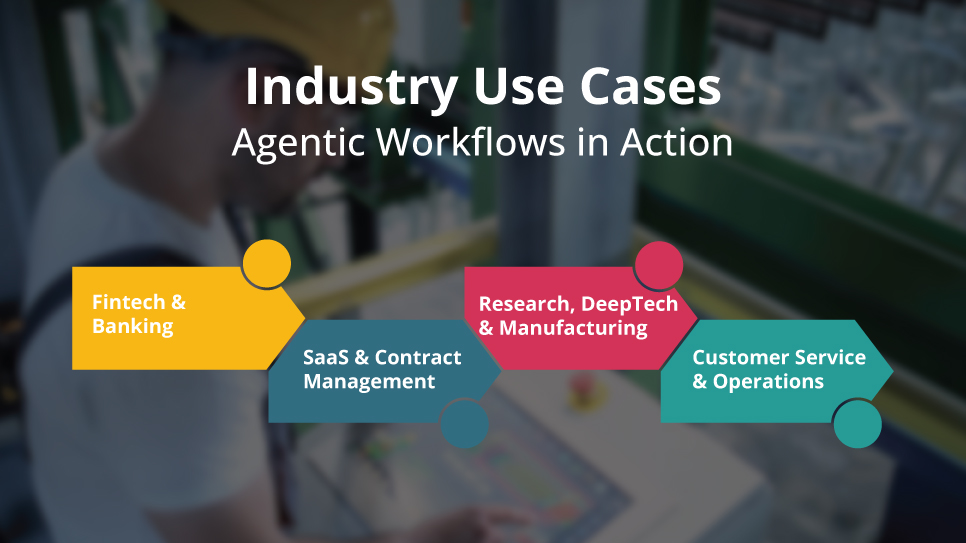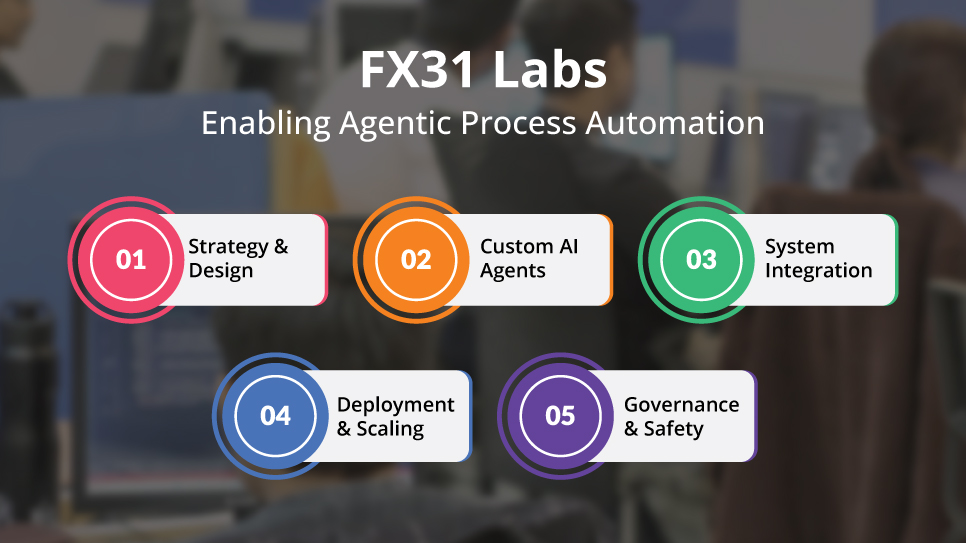Agentic AI Enterprise Workflows: Driving Autonomous Process Automation

2025 will mark a turning point for enterprise automation: agentic AI — autonomous, context-aware systems — is set to replace static bots and brittle RPA workflows. As Forrester forecasts, agentic AI is moving beyond content generation into real-time decision-making inside the enterprise.
Already, major platforms are integrating enterprise AI agents into workflows. The result is smarter automation that can adapt to changing conditions and handle unexpected inputs without human guidance – a game-changer for industries from fintech to deeptech.
What You’ll Learn
Agentic AI is reshaping how enterprises automate, and this blog shows you how. You’ll explore:
- Benefits of autonomous AI in enterprise workflows
- Real-world use cases across fintech, SaaS, manufacturing, and deeptech
- How FX31 Labs designs and integrates agentic systems at scale
- Why agentic workflows go beyond RPA to enable real-time, intelligent automation
- Key steps to build and deploy enterprise AI agents in your stack
This blog builds on our earlier insights into human-amplifying AI. Now, we shift focus to how autonomous agents are driving full-scale enterprise transformation, with FX31 Labs leading the way.
Agentic AI Enterprise Workflows vs. Traditional Automation
Agentic AI fundamentally differs from legacy automation. Traditional RPA and scripted workflows execute fixed, rule-based tasks and break when scenarios change. In contrast, agentic AI enterprise workflows use machine learning and reasoning so that AI agents can “make decisions in real-time” and adapt to changing conditions. In practice, this means agents learn from context instead of blindly following a flowchart. Key distinctions include:
- Adaptive Autonomy: Agentic systems adjust on the fly. As EY notes, AI agents can “adapt to changing conditions and handle unexpected inputs without manual oversight”. Legacy bots lack this flexibility – any exception requires human intervention.
- Complex Multi-Step Tasks: Agentic workflows string together multiple steps end-to-end (data gathering, analysis, decision, action) with a single AI agent, whereas traditional tools handle one step at a time. For example, an agentic workflow might take meeting notes, create tasks, and route approvals automatically; tasks older automation cannot chain.
- Deep Integration: Enterprise AI agents connect through APIs and knowledge layers across CRM, ERP, BI, and other systems. In agentic setups, data is pooled so the AI has a full context of the business. By comparison, traditional RPA often requires brittle point-to-point scripts to transfer data, making it hard to integrate across silos.
- Continuous Learning: Agentic AI improves with feedback. In one banking example, a traditional loan-review system automatically rejects a small business due to “irregular income,” but an agentic system learned to tailor the loan terms to the company’s seasonal cash flow. The AI even “provided business advice on potential revenue optimization,” whereas the old process simply flagged the case. Such agentic process automation can thus handle nuances that fixed rules miss.
- Intelligent Outcomes: Agentic systems produce customized results rather than generic outputs. They can “scale operations without compromising decision quality” and automate both simple and complex decision tasks in real-time. In short, agentic AI enterprise workflows embed decision intelligence into every step, unlike traditional automation, which only streamlines pre-set operations.
Strategic Benefits of Agentic Process Automation
Adopting agentic process automation unlocks major strategic advantages. Some key benefits include:
- End-to-end Efficiency: By automating multi-step processes, agentic AI dramatically reduces manual labor and cycle times. The World Economic Forum observes that agentic systems “streamline operations” (automating repetitive tasks like data entry, compliance checks, transaction processing) and free employees for higher-value work. This not only boosts throughput but also cuts error rates and costs.
- Improved Decision Intelligence: Agentic AI turns data into actionable decisions. Because agents can analyze large datasets in context, workflows become insight-driven. For example, in finance, an agent can continuously refine risk assessments or optimize asset allocations on the fly. This contextual decision-making is far beyond static dashboards or rulebooks.
- Innovation and New Services: Agentic workflows enable novel products. They can power personalized services (e.g., robo-advisors or AI-driven customer coaches) and adapt products in real time. WEF highlights that agentic AI is already driving innovations like “personalized robo-advisors” and adaptive finance tools. By automating the routine, businesses can redirect talent toward innovation, gaining a competitive edge.
- Enhanced Experience: Customers and employees see immediate gains. Customer-facing AI agents provide faster, more relevant support. For instance, instead of a rigid chatbot, an agentic system might understand a complex request and act (e.g., making transactions by voice). Internally, employees benefit when mundane tasks (IT tickets, HR onboarding) are handled autonomously. Overall satisfaction rises as users interact with intelligent, context-aware agents.
- Scalability & Flexibility: Agentic AI solutions scale in the cloud. They can handle spikes in work without retooling, and can learn new processes faster than rewriting code. This agility makes organizations more resilient to change – new markets, regulations or products can be supported simply by retraining or adding new agents.
Together, these benefits mean that agentic AI enterprise workflows do more than just cut costs; they fundamentally elevate business agility and insight. Organizations from fast-moving fintechs to automation-first manufacturing firms stand to gain significantly by embedding AI into their process automation.
Industry Use Cases: Agentic Workflows in Action

Many industries are piloting agentic AI to drive value. Real-world examples include:
- Fintech & Banking: In financial services, agentic workflows transform lending, trading, and compliance. For example, an AI loan officer agent can ingest customer records, market data, and weather patterns to autonomously approve loans with tailored terms, rather than using a one-size-fits-all checklist. The World Economic Forum envisions trading AI agents that “analyze market data and autonomously monitor market trends, adjust strategies and mitigate risks in real time” by integrating tools via APIs.
- SaaS & Contract Management: Software and SaaS companies are embedding agents into their products. Contract-management leader Icertis, for instance, is developing an agentic AI platform that autonomously processes routine tasks like invoice payments and low-risk contract approvals. In practice, a salesperson could simply ask the system to generate a contract; an AI agent would retrieve necessary data, create the draft, and kick off approvals without human key-in.
- Research, DeepTech & Manufacturing: In R&D settings, agentic AI acts like an autonomous scientist or engineer. A Nature report describes an AI “scientist” system that independently conducted astrobiology research, generating over 100 hypotheses about the origins of life. In engineering, NASA’s JPL and others are exploring agentic AI to plan experiments and missions. In manufacturing and industrial tech, agents can manage robotic assembly and supply chains.
- Customer Service & Operations: AI agents are revolutionizing support desks and internal help functions. Instead of FAQ chatbots, next-gen agents understand intent and execute actions. For example, Genesys CTO describes how a customer can simply ask an AI agent to “take money from my account that has the most money in it and move it to my checking account” – a complex, multi-step request that traditional bots cannot handle. An agentic workflow would parse this request, identify account data, and carry out the transfer.
These use cases – from finance to manufacturing – illustrate how agentic AI enterprise workflows deliver real ROI. They move beyond pilot projects: major vendors and startups alike are productizing agentic features in 2025, proving the concept in critical systems across sectors.
Building Agentic Workflows: Integration and Deployment
Putting agentic AI into production requires thoughtful integration. Key steps include:
- Workflow Identification: Map end-to-end business processes (e.g., loan approval, invoicing, IT ticketing) and identify high-value candidate workflows for agent automation.
- Data & API Access: Ensure agents have access to all necessary data and tools. This means connecting to enterprise systems (ERP, CRM, databases, messaging apps) via secure APIs. In an agentic workflow, agents rely on these “digital arms and legs” to act.
- Model & Agent Development: Select and train the right AI models. Large language models (LLMs) serve as the “brains” for reasoning, interpreting user intents, and planning steps.
- Orchestration & Compute: Deploy agents on a scalable infrastructure. Agentic workflows typically run in the cloud (AWS, Azure, GCP) to leverage elastic compute and storage. Container orchestration (e.g., Kubernetes) or serverless agents ensure the system scales with demand.
- Monitoring & Governance: Implement continuous monitoring. Agentic systems should include logging, performance dashboards, and human-in-the-loop safeguards.
Through this process of AI agent integration and deployment, organizations can transition from pilots to production-grade agentic workflows.Integration takes effort. But the payoff is transformative: self-running processes, from ingestion to action, embedded directly in your tech stack.
FX31 Labs: Enabling Agentic Process Automation

FX31 Labs is at the forefront of implementing these advanced workflows. We bring together AI research and software engineering to make agentic process automation practical for enterprises. Our approach covers every layer:
- Strategy & Design: We work with CTOs and tech leads to identify where enterprise AI agents will deliver the most impact, mapping data sources and user journeys for each agentic workflow.
- Custom AI Agents: Using cutting-edge tools (LLMs, multi-agent frameworks), we build agents tailored to your business logic – whether that’s underwriting algorithms for fintech, intelligent chat agents for SaaS, or analysis bots for deeptech.
- System Integration: We handle AI agent integration with your stack. That means connecting agents via APIs to CRM, ERP, databases, and other services so they have full contextual knowledge. We also ensure data pipelines and vector stores are in place for agent memory and reasoning.
- Deployment & Scaling: We deploy agents to cloud environments, using scalable orchestration so the system can grow. Our solutions include monitoring and AgentOps-style oversight to keep workflows reliable.
- Governance & Safety: We help establish guardrails – from input validation to ethical AI checks – so that agentic workflows remain secure and compliant as they scale.
By focusing on practical integration and robust engineering, FX31 Labs turns the promise of agentic AI into reality. We ensure that advanced autonomous agents enhance business workflows without disrupting existing operations. Our work is backed by thought leadership – from open-source tools (LangChain, AutoGen) to cloud best practices – so that clients can confidently adopt agentic AI enterprise workflows at scale.
Key Takeaways
- Agentic AI Enterprise Workflows: Embedding autonomous AI agents in workflows unlocks true end-to-end automation. These agentic workflows go beyond RPA by learning, adapting, and chaining complex tasks.
- Strategic Impact: Agentic process automation drives both efficiency and innovation. Businesses see major gains in productivity, decision quality, and customer experience when AI agents automate routine processes.
- Industry Validation: Leading companies and sectors (fintech, SaaS, deeptech, government) are already deploying agentic AI. Initiatives like PayPal’s agentic payment tools or Icertis’s contract AI platform prove the concept in real-world workflows.
- FX31 Labs Expertise: Our team specializes in designing and integrating enterprise AI agents. We guide clients through agentic transformation — from strategy to deployment — ensuring AI agent integration is seamless and scalable.
- Future-Ready Automation: The future of enterprise automation is agentic. Firms that master agentic AI enterprise workflows will outpace competitors. Now is the time to experiment with this technology, supported by experts like FX31 Labs, to stay ahead in the AI-driven economy.
By embracing agentic AI, organizations turn their digital pipelines into intelligent, self-driving systems. The era of autonomous workflows is here, and FX31 Labs is ready to help enterprises make the transition securely and successfully.
